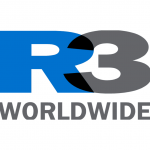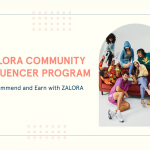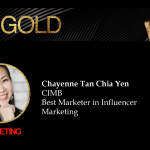In a Marketing Magazine Asia article carried last month, three Malaysian Indian influencers were interviewed to potentially uncover potential unconscious biases in branded influencer marketing campaigns, and how new ways could be explored to create a more inclusive and diverse influencer marketing industry as a whole.
In this article, together with Nuffnang Sdn Bhd we specifically explore both cultural inclusivity and body type diversity, based on learnings and examples from the beauty and fashion industry.
Before we even begin, it is important for brands to consider if these values are even important to them in the first place.
Consider a brand that sells shawls and coverings for Muslim women. Would it actually be reasonable to push for diverse cultural representation in their marketing communications?
While cultural diversity may not be fair to expect of the brand, they could still feature Malay women influencers of different skin tones, body sizes and backgrounds to foster a more inclusive marketing message.
Recognising the beauty and fashion industry’s role in promoting inclusive marketing, Nuffnang spoke to 3 brands and their representatives to gather their insights and learnings: Eena Houzayama, Head of Marketing & Activism at The Body Shop; Tara Tan, Chief Marketing Officer at XIXILI Intima; and Rodrigo Navarette, General Manager of Natura.
These brands are known by consumers and the industry for their commitment to inclusivity and diversity across their operations, messaging and products. We hope their insights inspire the industry to work towards a more inclusive and diverse marketing landscape in Malaysia.
Brands need to deeply consider the values that drive their creation of marketing content.
Both The Body Shop and XIXILI believe that their brand story and values drive their passion for championing inclusive and diverse marketing messages and campaigns.
For The Body Shop, it all originates from founder Anita Roddick, whose passion for human rights underpins the brand’s social activism. This passion extends throughout the organisation, attracting a team, customers and influencers who share values like inclusivity, diversity and youth empowerment.
Rodrigo from Natura emphasises their focus on building relationships alongside cosmetics development. Their belief in the uniqueness and beauty of every individual transcends differences in culture, religion, and background. As long as people align with Natura’s commitment to sustainability and relationship-building, they are welcomed.
The lingerie industry once revolved around Victoria’s Secret’s iconic fashion runways. But as social norms that define beauty and femininity change over the years, customers are now looking for something more from brands. XIXILI, a local Malaysian lingerie brand, champions the value of inspiring confidence in all women regardless of skin colour and body type and pioneered inclusive marketing communications from their top-funnel campaign shoots and videos.
Tara explains that customers appreciate the diverse and inclusive representation they see across all XIXILI communications, fostering a sense of being seen and heard. This relatability fosters loyalty as customers find both the products and relatability they seek.
Nuffnang’s Senior Leader (Campaign Strategy & Operations) Isaiah Saw (pic below) shares that storytelling is truly the winning element of successful influencer marketing campaigns. “Consumers no longer just want to know what a brand or product does, they want to know what they stand for.
Adopting a storytelling approach makes a brand and its products and services much more appealing to Malaysians, as they are able to relate and resonate with their target audience on a much deeper level.”

Brands, Marketers and Agencies can try to ensure the influencer selection process is free from unconscious biases and is truly inclusive.
By being value-focused from the start, The Body Shop, Natura and XIXILI naturally align their messaging with their values. This results in influencer and content creator choices that align with these values, eliminating unconscious biases towards different cultures, skin tones, religions, and more.
Since brands, marketers and agencies are responsible for choosing and approving a list of influencers and content creators they work with, they need to do their due diligence to ensure the influencer selection process is as unbiased as possible.
Nuffnang’s Influencer Selection Scorecard can help to bring more awareness and objectivity to the process for brands, as the Scorecard evaluates the right fit of influencers for brands in three key areas: campaign needs, impact and brand alignment.
Isaiah goes on to share, “The scorecard includes a scoring and ranking system that accounts for both ‘hard’ and ‘soft’ metrics, enabling clients toobjectively choose influencers that align with their campaign needs, rather than on their appearance or social media personality alone.”
However, it is essential to avoid being too forceful in incorporating inclusivity and diversity in marketing campaigns, which could unintentionally ostracise other groups. Tara shares XIXILI’s view on this, “By advocating too much for only plus-sized women, we may unintentionally ostracise skinny women, who equally deserve representation and to be seen in the marketing messages we put out.”
Eena continues on The Body Shop’s behalf, “Similarly with pushing messaging that focuses on ‘youthful skin’, we may unintentionally belittle or discriminate older or more wrinkled skin, and women shouldn’t be made to feel less beautiful simply because of our choice of words or product focuses.”
Consumers also play a role in challenging their own perspectives and beliefs and diversifying their social media following. We need to reflect on whether we remain open to having our beliefs challenged and expose ourselves to different influencers and content creators to avoid creating an echo chamber for the things we believe in or are most comfortable consuming.
Brands, Marketers and Agencies should be brave enough to give new things a try and remain open to feedback.
While these brands have pushed for social causes or values they truly believe in, Eena asserts that it’s always healthy to remember that we can never please everyone. Pushback is normal, regardless of the cause’s importance.
Tara also agrees as XIXILI received comments fixating on minor details on their website photos that seemed to signal non-inclusive messaging, but they missed the bigger picture that XIXILI champions for women day by day.

Take The Body Shop’s efforts to advocate for Malaysian youth empowerment for the nation’s General Elections in My Vote My Right 18 (pic). Some consumers commented, “What business does The Body Shop have with advocating for this?
How could a brand or business have such a strong political opinion?” While Eena believes that all brands should still engage in dialogue to hear from their consumers, she believes that brands should still stand up for what they believe is right and true. “By doing the right thing and remaining open to feedback and improvement, we can’t really go wrong,” Eena asserts.
Isaiah emphasises social listening and engaging in dialogues with consumers as critical to the success of influencer marketing campaigns. “As brands ultimately want their messaging to resonate with their target audience, it’s imperative to discern how certain marketing messages or which storytelling angles impact them the most.
This data will help us craft more focused and impactful influencer marketing strategies to aid brands in achieving their marketing objectives.”
At the end of the day, we truly need all hands on deck to create a more inclusive and diverse influencer marketing industry as it is not just a choice; it’s a collective responsibility. Each voice and effort contributes to the broader narrative of change in Malaysia.
Let’s continue to champion diversity, elevate underrepresented voices, and build a future where everyone is seen and heard, even after Malaysia’s Independence Day and Malaysia Day.
To learn more about how you can make your influencer marketing efforts more inclusive, please contact Nuffnang at [email protected].
MARKETING Magazine is not responsible for the content of external sites.









